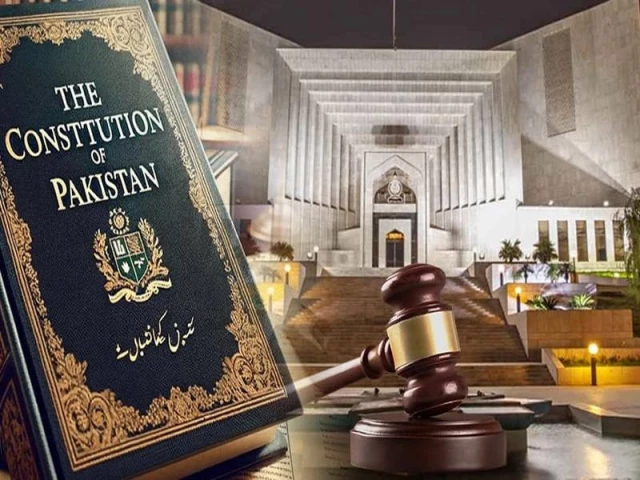Judicial SOPs stir debate
Debate flares over judiciary's independence after NJPMC meeting

As the heads of all superior courts have agreed to evolve a mechanism to end external interference, debate has begun on how effective the high court SOPs will be in curbing extraneous influence without adjudicating the 26th Constitutional Amendment, which, by admission, increased the executive's influence in judicial appointments and the selection of constitutional benches (CBs).
The National Judicial (Policy Making) Committee (NJPMC), comprising all chief justices, on Monday commended the high courts for formulating SOPsStandard Operating Proceduresfor judicial independence. The SOPs are expected to be notified soon.
Lawyers are questioning how external interference can end when NJPMC members themselves are beneficiaries of executive influence in the judiciary.
There is a strong perception that, without executive support, neither a lawyer can be appointed as a judge nor can a superior court judge be elevated to the apex court or a constitutional bench after the 26th Constitutional Amendment.
"There is an English idiom that fits here perfectly. It is when you close the stable door after the horse has bolted. Except here, the horse hasn't just bolted; the stable roof has also collapsed.
"Although I'm glad Justice Dogar of the Islamabad High Court (IHC) was present in the meeting which decided once and for all to end the menace of external interference," said Abdul Moiz Jaferii Advocate, while commenting on the NJPMC meeting to safeguard judges from outside pressure.
Another lawyer asked how independence can be secured when judges not in the good books of the executive have been sidelined and excluded from benches hearing important cases.
Former additional attorney general Waqar Rana said interference is just one manifestation of undermining judicial independence.
"Where appointments are subservient to the executive after the 26th Amendment, the policy notification issued by the Supreme Court may unfortunately look like a charade to the legal community.
"The chief justice, in order to truly ensure independence of the judiciary and stop interference, must take the first overdue courageous step and list the case of the 26th Amendment before the full court. Anything else will be viewed as window dressing," he added.
Taking advantage of the delay in adjudicating petitions against the 26th Amendment, executive authorities have successfully inducted more than three dozen judges in the high courts.
There is also a perception that court-packing of the high courts has already taken place. The situation has also changed in the apex court after the amendment.
Likewise, the executive initiated the transfer of judges from different high courts to the IHC. The real purpose of those transfers, critics say, was to prevent a senior judge from becoming IHC chief justice.
Although CJP Yahya Afridi had reservations about the seniority of the transferred judges, the executive managed to appoint Justice Sardar Muhammad Sarfraz Dogar as IHC CJ.
Despite his efforts, CJP Afridi could not secure approval from the Judicial Commission of Pakistan (JCP) for the appointment of Justice Miangul Hassan as the IHC chief justice.
Similarly, government authorities opposed the appointment of the senior-most judges of the Peshawar High Court and the Balochistan High Court as chief justices because they were not "like-minded."
The government thus succeeded, and the senior-most judges of both high courts were superseded by the JCP without valid reason.
Senior judges, including CJP Afridi, supported elevating Lahore High Court Chief Justice Aalia Neelum to the apex court. However, the government wanted her to continue as LHC CJ. The executive representatives in the JCP did not vote for her elevation.
Incumbent Sindh High Court Chief Justice Junaid Ghaffar has also not been selected for the CB in the high court because the executive representatives in the JCP did not vote for him.
Most significantly, the executive ignored the two senior-most judges of the apex court for the appointment of the CJP because they were not aligned with the present regime.
Interestingly, the NJPMC has approved a committee comprising judges, the attorney general for Pakistan, and the FBR chairman to address protracted litigation and injunctive orders in commercial, revenue, and fiscal cases.
Questions are being raised about the inclusion of the FBR chairman in the committee. Recently, CJP Afridi met with the finance minister to discuss tax-related reforms.
It is an open secret that the superior judiciary has failed to deal with external interference since six IHC judges wrote to the Supreme Judicial Council (SJC) last year. Since their letter, the judges have faced different forms of harassment, with proxy complaints filed against them in the SJC.
A senior lawyer said the surrender in the six judges' letter case laid the foundation, and the 26th Constitutional Amendment was a mere formality. When Malik Shahzad Ahmad Khan was LHC CJ, he sent a report to the SC regarding harassment of an ATC judge. The matter is still pending in the SC.
There is a need to assess the performance of the judiciary in the aftermath of the 26th Amendment. Debate continues about the performance of the CBs.



















COMMENTS
Comments are moderated and generally will be posted if they are on-topic and not abusive.
For more information, please see our Comments FAQ